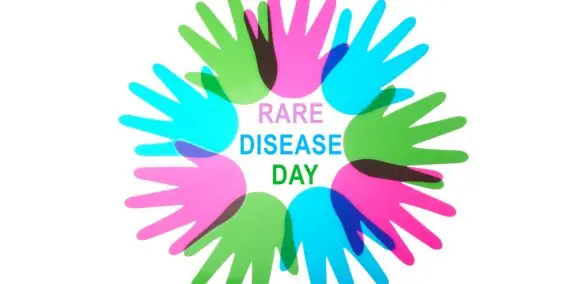World Rare Disease Day 2025
Rare Disease Day takes place annually on the last day of February and is a global opportunity to increase awareness and advocate for those living with rare conditions.

On the 28th of February 2025 it is World Rare Disease Day as part of this, we consider neurological and genetic disorders, such as Infantile onset Pompe Disease.
It has been estimated that around 3.5 million people in the UK are living with one of over 7000 rare diseases.
A rare disease is any disease that affects a small percentage of the population. Over 6000 rare diseases are characterised by a broad diversity of disorders and symptoms that vary not only from disease to disease but also from patient-to-patient suffering from the same disease. Rare Disease Day raises awareness for the 300 million people living with rare disease around the world and their families and carers.
Research is essential for advancing the understanding, diagnosis and treatment of rare diseases. EURODIS, a non-profit organisation supporting people with rare diseases, are urging Europe to reduce delays caused by regulatory approval processes and explore early access programmes. The lack of scientific knowledge and quality information of rare diseases often results in delays in diagnosis. Relatively common symptoms can hide underlying rare diseases leading to misdiagnosis and delaying treatment. Therefore, the patient’s quality of life is affected by the lack or loss of autonomy due to the chronic, progressive, degenerative, and frequently life-threatening aspects of the disease.
One in every 140,000 newborns are born with ‘Infantile Onset Pompe Disease’ that causes progressive weakness to the heart and skeletal muscles. It is caused by mutations in a gene that makes an enzyme called acid alpha-glucosidase (GAA), which the body uses to break down glycogen, a stored form of sugar used for energy. The enzyme performs its function in intracellular compartments called lysosomes, which function as cellular clearinghouses. Lysosomes ingest multiple substances including glycogen, which is converted by the GAA into glucose, a sugar that fuels muscles. Pompe disease, mutations in the GAA gene reduce or completely eliminate this essential enzyme, which causes buildup that damages the muscles of the skeletal muscles and heart most seriously. The severity of the disease and the age of onset, which varies widely, are related to the degree of enzyme deficiency. The most severely affected infants are affected within 3 months of birth. Symptoms can begin within the first months of life, with feeding problems, trouble breathing, muscle weakness, enlarged heart and floppiness.
Due to Pompe disease not being familiar with many physicians and they may have never had any patients with Pompe disease, the diagnosis is based on a thorough clinical evaluation. This consists of a detailed patient and family history and a variety of biochemical tests with first of all measuring the GAA activity. When a pregnancy is known to be of a risk of Pompe disease, preimplantation testing and prenatal diagnosis are also possible.
The treatment of Pompe Disease involves the coordinated efforts of a team of specialists. The input of paediatricians, internists, neurologists, cardiologists, dieticians, physical therapists and other healthcare professionals may be needed to develop the treatment plan which must be patient centred involving the patients’ descriptions which can provide data to specialists to help make a plan best suited to the patient. One form of treatment that is an approved treatment for all patients is Enzyme Replacement Therapy which involves the intravenous administration of recombinant human acid alpha-glucosidase (rhGAA) and has been proven to prolong life expectancy for patients but does not cure the disease.
Gene Therapy is an option which is helping to progress and develop and is useful for Pompe Disease and is directed towards restring the acid alpha-glucosidase production and activity in crucial tissues to improve respiratory capacity.
Steps to Take
If you are concerned about your babies’ treatment, you could take the following steps:
- Consult a Specialist: Seek an independent medical opinion to assess whether the care you received was appropriate. You are entitled to ask for a second opinion regarding your treatment and your options.
- Make a Complaint: Whether your care has been provided through the NHS or privately, you are entitled to make a complaint if you feel you’ve been let down.
- Request Medical Records: Gather all relevant medical documents that may help you to assess your treatment and to seek advice/guidance.
- Speak to a Lawyer: Contact a legal professional who specialises in medical negligence claims to discuss your options.
- Act Promptly: Be mindful of time limits, and take action as soon as possible.
If you believe you’ve experienced medical negligence related to treatment of a rare disease, it’s critical to act promptly as legal claims often have time limits. A legal or medical professional can guide you through your specific rights and next steps.
Contact us today
Get in touch now and let us show you that there is a positive way forward.
Please call us on 0800 234 3234 or contact us and a member of our legal team will call you back.